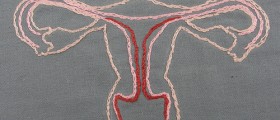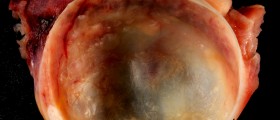
Women with Polycystic Ovary Syndrome produce higher than average amounts of hormones called androgens. This forms an obstacle for the production and release of eggs, which means not only that women with PCOS often do not ovulate, but it also means that cysts can develop instead of mature eggs to be released. Hence the term "polycystic ovaries"; ovaries with lots of cysts.
The ovaries may become enlarged, and women with PCOS often suffer from irregular periods or miss periods altogether. Many PCOS patients also have diabetic-like symptoms, because the condition may be partially caused by an overproduction of insulin. Some research suggest that this is the very cause behind higher androgen levels in people who have Polycystic Ovary Syndrome. The main symptoms that women with Polycystic Ovary Syndrome can have are:
Irregular menstrual periods, including a lack of ovulation Weight gain, being obese Excessive hair growth Acne Diabetes High blood pressure Uterine bleedingWomen with PCOS who are trying to conceive may face problems. Some women have success with exercise to lose weight, something that can often help induce ovulation if you are anovulatory. Others will need to use special weight loss medications, because keeping weight off is a hard task with PCOS. If you have any of these symptoms, it is a good idea to see your doctor for a check-up. PCOS can cause various complications, and is hard to treat. But, with PCOS, it is a good idea to be under the watchful eye of a medical professional.
- www.womenshealth.gov/a-z-topics/polycystic-ovary-syndrome
- medlineplus.gov/polycysticovarysyndrome.html
- Photo courtesy of BruceBlaus by Wikimedia Commons: commons.wikimedia.org/wiki/File:PCOS.png

















Your thoughts on this
Loading...